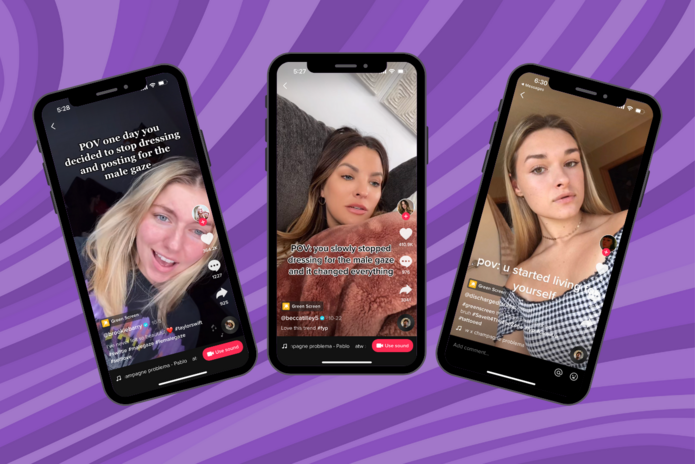A new trend focusing on the male gaze on TikTok is exposing creators’ internalized misogyny. Using a mashup of “All Too Well” and “Champagne Problems” by Taylor Swift (that’s right, female-in-a-male-dominated-industry, all-about-women’s-empowerment Taylor Swift), TikTokers celebrate their shift away from wearing more revealing clothes with the caption, “POV: you stopped dressing for the male gaze.”
The trend started out as a way for women who had become happier by living for themselves (often after leaving a toxic situation or relationship) to show their progress through the way they preferred to present themselves. But it’s since spiraled into an attack on women who choose to dress in more revealing clothing – no matter how unintentional that shift may have been.
While creators try to compliment themselves for dressing more conservatively, the trend ultimately fails by shaming more provocative outfit choices as a result. In condemning said outfits as a presentation for the male gaze, the trend insinuates that the only reason a woman would wear a tight or skimpy outfit is to appease a man. This isn’t necessarily the case, and some TikTokers are doing God’s work by mocking the trend.
There’s a difference between being sexual, where you’re embracing your own sexuality, and being sexualized, where you’re being objectified. As author and gender researcher Farida D. says in her short essay collection Rants Of A Rebel Arab Feminist, and summarizes on Instagram, “The patriarchy keeps ownership of female sexuality by shaming us for being sexual. We start to learn, early on, that the only acceptable way for us to be sexual is when we are sexualized by men. We thus normalize being sexualized, and shun being sexual.” According to the American Psychological Association’s 2007 Report on the APA Task Force on the Sexualization of Girls, healthy sexuality is a crucial component of physical and mental health. Expressing your own sexuality, whether through clothing, behavior, or otherwise, doesn’t automatically invite sexualization; there isn’t a person on earth whose value comes from their sex appeal alone.
You can have your breasts out or your tummy showing and still be dressing for no one other than yourself. Someone can choose to put on a skintight skirt without signaling that they’ve put it on for someone else. If you feel confident in tighter clothes, if you love that cleavage-boosting, low-cut top you found on sale, or if it’s really hot outside and you just want to wear the least amount of fabric you can get away with, it’s your prerogative to do so. Of course, you can choose to dress conservatively as well. But we shouldn’t be judging women regardless.
This reeks of “I’m not like other girls,” a cringe-worthy phrase many of us are likely guilty of saying in the past. “Other girls” refers to stereotypically feminine traits, like carefully applying makeup each morning or obsessing over boys or being grossed out by bugs, and those who claim to not be like other girls look down upon embodying traditional femininity, implying that femininity makes you “weak.” By not expressing femininity, a “not-like-other-girls” girl believes she makes herself more attractive to men by purposefully distancing herself from other women. Ironically, these women are also playing into the male gaze by trying to separate themselves from it. If you select an outfit based entirely on whether or not a man will be interested in it, they’re subsequently controlling your style.
So, let’s stop shaming women for dressing and behaving and posing how they want to. Embrace your femininity, show off your assets, or live exclusively in an oversized sweatshirt – just do it for yourself.
Studies Referenced:
American Psychological Association,Task Force on the Sexualization of Girls. (2007) Report of the APA Task Force on the Sexualization of Girls.


